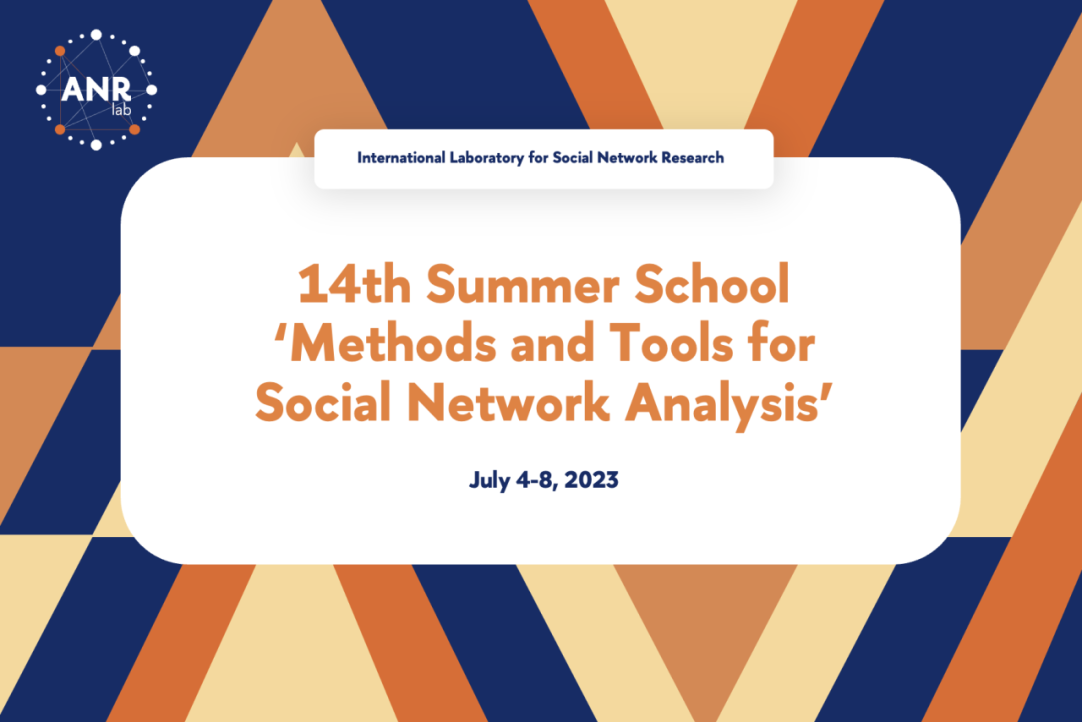How the 14th ANR-Lab Summer School 'Methods and Tools for Analyzing Social Networks' went
On July 8, the Summer School 'Methods and Tools for Analyzing Social Networks' ended. We present you a brief overview of the events that the ANR-Lab team held as part of the 14th Summer School.

On the first day, our esteemed colleagues and scientific advisors of ANR-Lab Vladimir Batagelj and Anuška Ferligoj delivered a welcoming speech. In their speeches, colleagues emphasized how exciting and productive it is to study the networks of interaction between people, because this is a fundamentally different perspective on us and society as a whole. And since such an optic is quite unique, it has a lot of potential, as well as a significant number of milestones that still have to be passed. One of the methods of moving towards these milestones, network blockmodeling, was introduced to us by Marjan Cugmas from the University of Ljubljana, a leading research center in the field of network analysis. The essence of the blockmodeling method is to identify the main patterns in large-scale social networks, to discover unobservable associations of the nodes in these networks. Marian explained what the tool blockmodeling is, what its types and components are, and also shared useful practical tips from his research experience on how to determine that blockmodeling is done correctly.
Then the head of ANR-Lab, Daria Maltseva, gave an exciting master class on the Pajek program, specifically designed (by Vladimir Batagelj) to study large networks in a user-friendly way. Daria took the audience through each step of the analysis and showed how easy it is to start analyzing networks in Pajek. It is so simple that it can even work with text files, and it is so rich in its capabilities that it has won numerous competitions as the best network visualization tool.
On the second day of the Summer School, students continued to immerse themselves in network analysis tools. ANR-Lab Junior Research Fellow, Tamara Shcheglova, talked about Gephi, one of the most popular and elegant open-source network analysis tools. After discussing the basic principles of network visualization, Tamara showed some advanced Gephi plug-ins for working with geospatial data and bipartite networks, as well as practical ways to extract network data from texts without using any code! The rest of the day was devoted to network analysis in R. ANR-Lab’s Analyst Anna Semenova spoke in detail about the basic principles of both network analysis and programming in R. Later, Anna showed how to create interactive networks in R, and, moreover, built a network of interconnections between all characters in the Harry Potter universe.
The third training day was devoted to the analysis of texts by network methods. Two intensive courses were held by ANR-Lab’s researcher Ilia Karpov, who presented network embedding models. The main problem discussed was extracting and combining real raw data into a format suitable for traditional network analysis methods. Ilia used semantic network analysis as an example and showed some advanced data formatting techniques and tools.
Then Irina Pavlova, Deputy Head of ANR-Lab and the Master's Programme 'Applied Statistics with Network Analysis', held a useful practical session on using the VOSviewer program to build a bibliometric networks. The participants received a comprehensive guide to the program and saw examples of building a conceptual framework for their own research and mastered the tool for analyzing the structure of the scientific sphere in general.
At the end of the day, Research Assistant Vasilisa Vashchenko spoke about hierarchical stochastic blockmodeling and its implementation for topic modeling. Vasilisa presented the essence of the method, showed an example from her thesis, and taught the audience how to implement the method using Python.
During the 4th day, ANR-Lab’s Analyst and Associate Professor of the Department of Sociology, Sergey Davydov, presented his own research projects based on network analysis. The first case was devoted to the journalistic community and its structure. Sergey presented the roles that journalists often play in the media sphere and an analysis of the hierarchy of these roles. His second project was devoted to the peculiarities of the perception of the virtual world on the example of the animated series "Smeshariki". The study used survey methods and eye-tracking techniques to determine how different people watch the show. The characters' social and personality traits were studied to explain their appeal to certain groups of viewers.
Then, Research Assitant Lika Kapustina held a master class on data parsing from the social network Vkontakte. Lika introduced the social network interface, told the audience about the API and used Python to extract data.
The last day of the school was devoted to qualitative network analysis. ANR-Lab’s Junior Research Fellow, Aryuna Kim, showed the theoretical and methodological premises of the intersection of network analysis and quality paradigm. Aryuna examined the history of their interaction and initially close cooperation in the social sciences, demonstrated a model of the rootedness of the individual as a social agent in a multi-layered network space of communication and social action. The theoretical and methodological foundation laid down by Aryuna was then demonstrated in practical implementation by Alexander Pakhomov, a Research Assistant at ANR-Lab. Alexander spoke about his research into addiction recovery communities and showed that even the location of participants in a room, from a network point of view, can help to understand a lot about the meanings that they associate with their efforts to overcome addictions.
We can say that the Summer School was definitely productive this year! Our main outcomes are outlined in the infographics. We have attracted a significant audience with a diverse background, increased our recognition, and most importantly, we have taken another significant step towards popularizing social network analysis!
You can watch recordings of performances from the summer school here.
